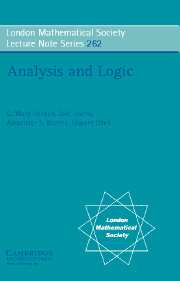Book contents
- Frontmatter
- Contents
- Preface
- Introduction
- Part One: Ultraproducts in Analysis
- Actions of Polish Groups and Classification Problems
- On Subspaces, Asymptotic Structure, and Distortion of Banach Spaces; Connections with Logic
- 1 Introduction
- 2 Background material: The 60's and 70's
- 3 The unconditional basic sequence problem and connections with distortion
- 4 Gowers' dichotomy: A block Ramsey Theorem
- 5 Distortion
- 6 Asymptotic structure
- 7 Ordinal Indices
- 8 The homogeneous Banach space problem
- 9 Concluding remarks
- References
9 - Concluding remarks
Published online by Cambridge University Press: 05 May 2013
- Frontmatter
- Contents
- Preface
- Introduction
- Part One: Ultraproducts in Analysis
- Actions of Polish Groups and Classification Problems
- On Subspaces, Asymptotic Structure, and Distortion of Banach Spaces; Connections with Logic
- 1 Introduction
- 2 Background material: The 60's and 70's
- 3 The unconditional basic sequence problem and connections with distortion
- 4 Gowers' dichotomy: A block Ramsey Theorem
- 5 Distortion
- 6 Asymptotic structure
- 7 Ordinal Indices
- 8 The homogeneous Banach space problem
- 9 Concluding remarks
- References
Summary
We have not addressed certain important problems that remain unsolved after many years concerning the classical Banach spaces themselves.
(Q13) Let K be a compact metric space. Is every complemented sub-space of C(K) isomorphic to C(L) for some compact metric space L?
It is known that if K is uncountable then C(K) is isomorphic to C[0,1]. If if is countable then C(K) is isomorphic to C(ωωα) for some α < ω1. Every complemented subspace of c0 (isomorphic to C (ω)) is either finite dimensional or isomorphic to c0 ([Pel]). If X is complemented in C[0,1] and X* is nonseparable then X is isomorphic to C[0,1] [R6]. Every quotient of c0 embeds isomorphically into c0 but this does not hold in general for C(ωωα). A discussion of these and related results may be found in [A1, A2, A3, A4], [Gal, Ga2], [Bo2].
The isomorphism types of the complemented subspaces of L1[0,1] remain unclassified.
(Q14) Let X be a complemented (infinite dimensional) subspace of L1[0,1]. Is X isomorphic to L1 or l1?
Every X which is complemented in lp (1 ≤ p < ∞) or c0 is isomorphic to lp or c0. There are known to be uncountably many mutually nonisomorphic complemented subspaces of Lp[0,1] (1 < p < ∞, p ≠ 2) [BRS] and all are known to have a basis [JRZ]. These spaces have been classified as ℒp spaces ([LP], [LR]), provided they are not Hilbert spaces.
- Type
- Chapter
- Information
- Analysis and Logic , pp. 254 - 256Publisher: Cambridge University PressPrint publication year: 2003



